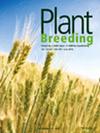无叶柄玉米新砧木:叶片结构和单倍体诱导率评价的遗传资源研究
IF 1.5
4区 农林科学
Q2 AGRONOMY
引用次数: 0
摘要
无舌叶突变体产生有缺陷的舌叶和耳廓,因此比舌叶突变体有更多的直立叶片,使其成为植物结构研究的有用遗传材料。此外,由于无舌性状的隐性特性和对苗期表型的适应性,无舌突变体被广泛用于玉米单倍体诱导系(HILs)的“概念证明”论证和单倍体诱导率(HIR)的评估。玉米中常用的无舌测试器是温带品种,在热带/亚热带条件下使用和维护具有挑战性。本研究利用农艺优势的热带舌形系(v407和CM 152)与温带源无舌形供体(PDH‐3和PDH‐8)杂交获得的无舌系(v601、v602、v603和v604)的不同农业形态性状进行了评价。以无舌瓣系v602为检测材料,对单倍体诱导系EC937890 (CIM2GTAILP2)的HIR进行了评价。结果显示EC937890的平均HIR为12.42%,与其他研究报告的HIR一致,从而证明了v602作为测定HIR的测试方法的有效性。因此,本研究报道的农艺上优越的无舌玉米品系将为叶片结构研究、候选HIR评估以及目前在双单倍体(DH)计划中广泛使用的HIR的高HIR维持提供宝贵的资源。此外,这些遗传资源在遗传背景中携带无舌性状,与早熟的印度公共玉米种质具有已知的杂种亲和性,因此可以直接用作杂交开发计划中的亲本。本文章由计算机程序翻译,如有差异,请以英文原文为准。
New liguleless (lg2) maize stocks: Genetic resources for leaf architectural and haploid induction rate assessment studies
Abstract Liguleless mutants produce defective ligules and auricles and, consequently, have more upright leaves than their ligulate counterparts, making them useful genetic material for plant architectural studies. Besides, owing to the recessive nature and amenability of the liguleless trait to phenotyping at the seedling stage, liguleless mutants are popularly used for ‘proof‐of‐concept’ demonstration and assessment of haploid induction rate (HIR) of haploid inducer lines (HILs) in maize. The commonly used liguleless testers in maize are of temperate origin and are challenging to use and maintain under tropical/sub‐tropical conditions. In the present study, liguleless lines (V 601, V 602, V 603 and V 604) derived from crosses between agronomically superior locally adapted tropical ligulate lines (V 407 and CM 152) and liguleless donors of temperate origin (PDH‐3 and PDH‐8) were evaluated for different agro‐morphological traits. Liguleless line V 602 was also used as a tester to assess the HIR of haploid inducer line EC937890 (CIM2GTAILP2). The results showed a mean HIR of 12.42% for EC937890, consistent with the HIR reported in other studies, thus demonstrating the efficacy of V 602 as a tester for determining HIR. The agronomically superior liguleless maize lines reported in this study will, therefore, be a valuable resource for leaf architectural studies, assessment of HIR of candidate HILs and maintenance of high HIR in the HILs presently in wide use in the doubled haploid (DH) programmes. Additionally, these genetic stocks carry the liguleless trait in genetic backgrounds with known heterotic affinity with early maturity Indian public maize germplasm and, therefore, can be used directly as parents in hybrid development programmes.
求助全文
通过发布文献求助,成功后即可免费获取论文全文。
去求助
来源期刊

Plant Breeding
农林科学-农艺学
CiteScore
4.40
自引率
5.00%
发文量
74
审稿时长
3.0 months
期刊介绍:
PLANT BREEDING publishes full-length original manuscripts and review articles on all aspects of plant improvement, breeding methodologies, and genetics to include qualitative and quantitative inheritance and genomics of major crop species. PLANT BREEDING provides readers with cutting-edge information on use of molecular techniques and genomics as they relate to improving gain from selection. Since its subject matter embraces all aspects of crop improvement, its content is sought after by both industry and academia. Fields of interest: Genetics of cultivated plants as well as research in practical plant breeding.
 求助内容:
求助内容: 应助结果提醒方式:
应助结果提醒方式:


